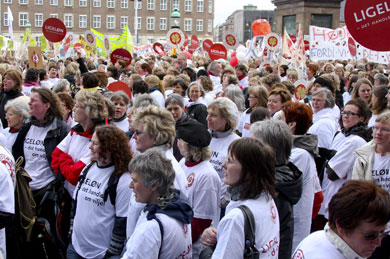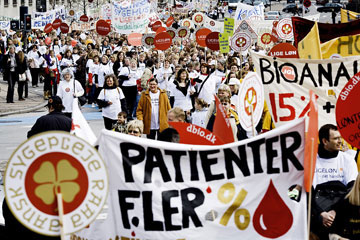More than 100,000 public sector workers have been on strike in Denmark since 16 March - the biggest strike ever in the public sector. The strike includes kindergarten workers, nurses, healthcare assistants and other medical staff. The sectors on strikes have a big majority of female workers and one of the main demands is for equal pay.
 The
strike was sparked off by the collective wage negotiations. The right-wing
government under Anders Fogh Rasmussen has imposed a 12.8% rise in pay,
pensions and bonuses spread over the next three years. But it is clear that
this will not keep up with inflation. Over the last six months alone, inflation
has been at 6% on an annual basis.
The
strike was sparked off by the collective wage negotiations. The right-wing
government under Anders Fogh Rasmussen has imposed a 12.8% rise in pay,
pensions and bonuses spread over the next three years. But it is clear that
this will not keep up with inflation. Over the last six months alone, inflation
has been at 6% on an annual basis.
The kindergarten workers and healthcare assistants have been out in several wild-cat strikes during the last two years. During the kindergarten strikes in 2006, the Social Democratic leaders were given the opportunity to kick out the right wing out of government, leaning on the protest movement. But this possibility was lost, because the right-wing leadership of the party was afraid to take power on a wave of strikes and protests.
Over the last period, conditions in the public sector have worsened every year. The labour force has been squeezed to the last drop. This can be seen in the fact that the nurses are supposed to keep a so-called "emergency standby" to avoid life-threatening situations. But in many places, this "emergency standby" has become the normal state of affairs, and around 10,000 nurses cannot strike due to this fact.
In the whole public sector, skilled personnel are being replaced by unskilled labour. Private sub-contracts are thriving, which puts an enormous drain on the budgets. The workers are forced to run even faster and the lunch and coffee breaks are now being attacked. Conditions have become unbearable.
All opinion polls show massive support for the strikers. According to a recent poll, 80 percent of the population support the strikers' demand for a minimum 15% pay rise. Female workers only earn 81 Danish kroner for every 100 the male workers are paid, so one of the main slogans of the struggle is equal pay for workers in the women-dominated public sector jobs.
 Equal
pay was officially introduced in 1973 after a big struggle with 250,000 workers
on strike and a bosses' lock-out. This fact shows that even the formal right to
equal pay was only achieved after hard struggle. But formal equal pay is only a
piece of paper. Real equal pay - and a wage one can live on - can only be
achieved by common struggle involving the whole working class.
Equal
pay was officially introduced in 1973 after a big struggle with 250,000 workers
on strike and a bosses' lock-out. This fact shows that even the formal right to
equal pay was only achieved after hard struggle. But formal equal pay is only a
piece of paper. Real equal pay - and a wage one can live on - can only be
achieved by common struggle involving the whole working class.
The main weakness of the strike so far is to be found in the divisions within the labour movement. The union leaders of the office workers, most of the kindergarten workers (who are divided into two unions for technical reasons), janitors, teachers, academics and others have all accepted the below-inflation 12.8% rise. They managed to get a "yes" vote from the membership, partly because they sold this agreement as a "historical achievement", and partly because many workers could not see any alternative but to vote in the affirmative. This is because of the lack of an organized force in the trade union movement that could challenge the present leadership.
Some of the trade union leaders who accepted the infamous 12.8% deal have openly declared that they hope the strikes suffer a defeat! If the strikers win, they say, their own members would strike for better pay as well. This just shows how far away these leaders have moved from the membership, as they accept a cut in real wages while they know that the members are ready to battle the employers.
With huge support from the strikers, the trade union leaders in the entire public sector could easily call for a common strike for better pay - and achieve the demands from the floor, which has been much more than 15 percent over three years.
 The
Municipal bosses' union have threatened to lock out all workers in the FOA
union (who now has 34,000 or 15 percent of its members on strike). This is a
serious threat, as those who are not on strike care for the elderly, sick and
small children. This shows the hypocrisy of the bosses - they don't care about
human suffering, only about "responsible budgets" and further privatisation and
destruction of the public sector. The only answer to this threat is to draw
private sector workers into the strike. When this was suggested by the FOA
chairman Dennis Kristensen, the bosses retreated, but the threat remains.
The
Municipal bosses' union have threatened to lock out all workers in the FOA
union (who now has 34,000 or 15 percent of its members on strike). This is a
serious threat, as those who are not on strike care for the elderly, sick and
small children. This shows the hypocrisy of the bosses - they don't care about
human suffering, only about "responsible budgets" and further privatisation and
destruction of the public sector. The only answer to this threat is to draw
private sector workers into the strike. When this was suggested by the FOA
chairman Dennis Kristensen, the bosses retreated, but the threat remains.
On the political front, the Socialistisk Folkeparti (Socialist People's Party - a split from the Communist Party in 1956) have emerged enormously strengthened over the last two years. At the last election in November 2007, they almost doubled their vote to 13 percent. This was achieved after a period of wildcat strikes in the public sector, where the SF defended the demands of the strikers in parliament. SF has big support among public sector workers, and recent polls gives the party close to 20 percent - almost the same as the Social Democracy (who suffer from a historic crisis under the right-wing leadership of Helle Thorning-Schmidt).
The right-wing government is completely paralysed. The Prime Minister Anders Fogh Rasmussen refuses to utter a word about the strike. The reason for this is clear: although the right-wing gangsters would like to intervene and impose the 12.8% diktat on the strikers, they know that this is a very dangerous situation for them. With huge support among the population - a large and well-organized working class backing the strikers' demands - such an intervention at the present moment could spark off an explosion, like the general strike in 1985.
What is needed now is workers' unity. The leaders of all the public sector must make use of the favourable moment to join the strike, and the private sector workers - who hold the real power to bring Danish capitalism to a standstill - must be ready to put muscle behind their verbal support. All trade union activists must fight to expand the strike to win the demands.
See also:
- Denmark: Massive demonstrations for better welfare – the struggle must continue! by Marie Frederiksen (October 3, 2007)
